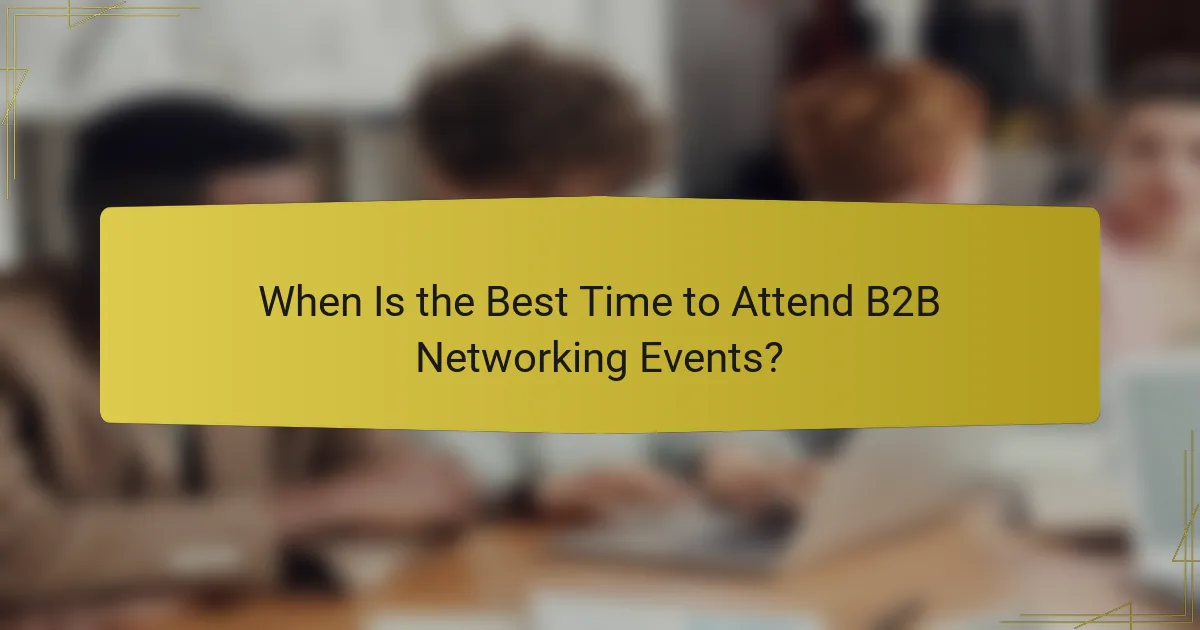B2B networking events are essential for professionals looking to connect and grow their business relationships. By selecting the right event that aligns with your objectives and industry relevance, you can maximize your networking potential. Timing also plays a crucial role, as attending events during peak industry cycles can significantly enhance your opportunities for collaboration and success.

What Are the Best B2B Networking Events in the US?
The best B2B networking events in the US include industry-specific conferences, trade shows, local business meetups, virtual networking events, and webinars. Each type offers unique opportunities for professionals to connect, share insights, and foster business relationships.
Industry-specific conferences
Industry-specific conferences are gatherings focused on particular sectors, such as technology, healthcare, or finance. These events typically feature keynote speakers, panel discussions, and networking sessions tailored to the industry, allowing attendees to gain insights and make valuable connections.
When selecting a conference, consider the agenda, the caliber of speakers, and the networking opportunities available. Events like the Consumer Electronics Show (CES) or the National Retail Federation’s Big Show are prime examples where industry leaders converge.
Trade shows
Trade shows are exhibitions where businesses showcase their products and services to potential clients and partners. These events often include booths, demonstrations, and presentations, providing a platform for companies to engage directly with their target audience.
To maximize your experience at a trade show, plan ahead by identifying key exhibitors and scheduling meetings in advance. Events like the International Manufacturing Technology Show (IMTS) or the American International Toy Fair are excellent for networking within specific industries.
Local business meetups
Local business meetups are informal gatherings that bring together professionals from the same geographic area. These events can vary in size and format, from casual coffee meetups to structured networking sessions.
Participating in local meetups can help build relationships within your community. Websites like Meetup.com or local chambers of commerce often list these events, making it easy to find opportunities to connect with nearby professionals.
Virtual networking events
Virtual networking events have gained popularity, especially in recent years, allowing professionals to connect from anywhere. These events often use video conferencing tools to facilitate discussions, breakout sessions, and networking opportunities.
When attending virtual events, ensure you have a reliable internet connection and a quiet space. Platforms like Zoom or Hopin are commonly used for these gatherings, which can help you expand your network without geographical limitations.
Webinars and workshops
Webinars and workshops provide educational content while also offering networking opportunities. These events often feature expert speakers who share insights on specific topics, followed by Q&A sessions where attendees can interact.
Look for webinars that align with your industry interests and include networking components. Participating in these events can enhance your knowledge while connecting you with like-minded professionals.

How to Select the Right B2B Networking Event?
Selecting the right B2B networking event involves aligning your objectives with the event’s offerings. Focus on your goals, the relevance of the event to your industry, and the demographics of attendees to ensure a productive experience.
Define your networking goals
Clearly defining your networking goals is crucial for selecting the right event. Consider whether you aim to generate leads, establish partnerships, or gain industry insights. Having specific objectives will help you assess which events are most likely to meet your needs.
For example, if your goal is to find potential clients, prioritize events that attract your target audience. Conversely, if you seek collaborative opportunities, look for events that feature industry leaders and innovators.
Evaluate event relevance
Assessing the relevance of an event to your business sector is essential. Look for events that focus on your industry trends, technologies, or challenges. This ensures that the discussions and networking opportunities will be pertinent to your interests.
Review the agenda, speakers, and topics covered to gauge relevance. Events that feature workshops, panels, or case studies related to your field can provide valuable insights and connections.
Consider attendee demographics
Understanding the demographics of attendees can significantly impact your networking success. Analyze the profiles of previous attendees, including their industries, roles, and company sizes. This information helps you determine if the event will attract the right people for your networking goals.
For instance, if you are a startup looking for investors, an event with a high concentration of venture capitalists and angel investors would be ideal. Conversely, if your focus is on corporate partnerships, seek events that attract established companies.
Assess location and timing
The location and timing of a B2B networking event can influence your decision. Consider whether the event is easily accessible for you and your target audience. Events in major business hubs often attract more attendees and provide better networking opportunities.
Additionally, evaluate the timing of the event. Avoid scheduling conflicts with major industry conferences or holidays, as these can reduce attendance. Aim for events that occur during peak business seasons to maximize participation and engagement.

When Is the Best Time to Attend B2B Networking Events?
The best time to attend B2B networking events typically aligns with industry cycles, seasonal trends, and personal schedules. Understanding these factors can enhance your networking effectiveness and opportunities for collaboration.
Seasonal trends
Seasonal trends can significantly influence attendance and the type of networking events available. For instance, spring and fall often see a surge in conferences and trade shows, as many companies aim to launch new products or initiatives during these periods. Conversely, summer months may have fewer events due to vacations, while winter can be busy with holiday-themed gatherings.
Consider planning your attendance around these seasonal peaks to maximize your networking opportunities. Researching local events in advance can help you identify the best times to engage with potential partners.
Industry calendar
Each industry has its own calendar of key events, such as trade shows, conferences, and expos. These events are often scheduled annually or biannually, making it essential to stay informed about your specific sector’s calendar. For example, technology firms may prioritize events like CES or TechCrunch Disrupt, while healthcare companies might focus on MedTech or BIO International.
Aligning your networking efforts with these industry-specific events can lead to more meaningful connections and collaborations. Regularly check industry publications or websites to track upcoming events relevant to your field.
Event frequency
The frequency of B2B networking events varies by industry and region. Some sectors may host monthly meetups, while others might have quarterly or annual events. Understanding how often these events occur can help you plan your networking strategy effectively.
For example, if your industry hosts frequent local meetups, you might choose to attend several smaller events instead of a few large conferences. This approach can provide more opportunities for one-on-one interactions and relationship building.
Personal availability
Your personal schedule is a crucial factor in determining when to attend B2B networking events. Consider your work commitments, travel plans, and personal obligations when selecting events to attend. Prioritize events that align with your professional goals and offer the best potential for valuable connections.
To avoid conflicts, maintain a calendar of upcoming events and block out time for networking activities. This proactive approach ensures you can take advantage of opportunities without compromising your other responsibilities.

What Impact Do B2B Networking Events Have on Businesses?
B2B networking events significantly influence businesses by fostering connections that can lead to new opportunities and collaborations. These events enhance relationships, facilitate knowledge sharing, and can drive growth through various channels.
Lead generation
B2B networking events are a powerful tool for lead generation, allowing businesses to connect directly with potential clients and partners. Engaging in conversations and exchanging contact information can result in a pipeline of qualified leads.
To maximize lead generation, businesses should prepare by identifying target attendees and crafting a clear value proposition. Following up promptly with new contacts can further increase the chances of converting leads into customers.
Brand visibility
Participating in B2B networking events enhances brand visibility by placing businesses in front of a relevant audience. This exposure can help establish a company’s reputation and position it as a thought leader in its industry.
To improve brand visibility, companies should consider sponsoring events or hosting workshops. Consistent branding across promotional materials and engaging presentations can leave a lasting impression on attendees, increasing the likelihood of future business opportunities.
